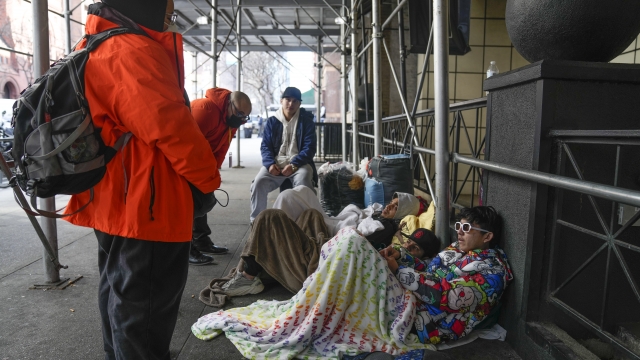In despair and visibly exhausted, groups of migrants are refusing to leave a hotel in midtown Manhattan to relocate to a new relief center in Red Hook, Brooklyn.
Dozens of police mobilized in an effort to control the peace, as the irritated and tired migrant men demanded to be allowed back into the Manhattan hotel. New York City Mayor Eric Adams' office says the NYPD only responded after individuals who were not asylum seekers assigned to the Watson Hotel rushed in and tried to enter.
Last weekend, Adams' office relocated single male migrants to the new Brooklyn Cruise Terminal relief center.
According to a statement from Fabien Levy, Adams' press secretary, the transition occurred to make room in the hotel for asylum-seeking families with children. It went on to say: "The facilities at Brooklyn Cruise Terminal will provide the same services as every other humanitarian relief center in the city, and the scheduled relocations to Brooklyn Cruise Terminal this weekend took place as planned."
But some migrants say they won't go due to inhumane conditions at the new center.
Venezuelan migrant Nelson Piñango took a bus to the new facility but was only there for a few hours before returning to the Watson Hotel, hoping to get his room back. He said the new center's showers are two blocks away with no hot water and that the beds are "like hospital stretchers."
"It is not suitable for sleeping; it is not suitable for living," Piñango said. "We didn't come to this country for luxuries or to be taken care of by the government. We came here to work for our families. We also deserve to be respected just like any other person."
According to the mayor's office, the building at the Brooklyn Cruise Terminal is heated and temperature controlled, and everyone is assigned a storage space for personal belongings, though Piñango said no one has their personal things with them.
Piñango is one of the hundreds of migrants who was previously sent to tents on Randall's Island, but the shelter was short-lived due to its lack of use, according to Adams, who then moved the migrants — mostly single adult men — to the Manhattan hotel.
"The mayor sent us to the island and removed us from there because it was cold," Piñango said. "Now we're going through the same thing here. It's not right."
Piñango said he's questioning if this is the harsh reality of the American dream.
"The situation right here is just pure negligence and anti-immigrant sentiment," said Yajaira, a mutual aid activist.
Yajaira, who asked Scripps News not to use her last name over fear of retaliation from anti-immigrant groups, says the city has enough rent-stabilized apartments to house the newly arrived migrants and homeless in the city.
"There's 88,000 rent-stabilized apartments available and 60,000 unhoused folks in homeless shelters, so there's more vacant apartments — rent-stabilized, vacant apartments — available than unhoused folks in New York City," she said. "We don't understand why those apartments are not being released to migrants."
Most men who had already been relocated to the new facility refused to go and instead camped outside the hotel overnight in makeshift tents. But the NYPD cleared the tents in the morning.
Adams has criticized the Biden administration for the situation, saying the president's response to the border crisis hasn't been sufficient.


